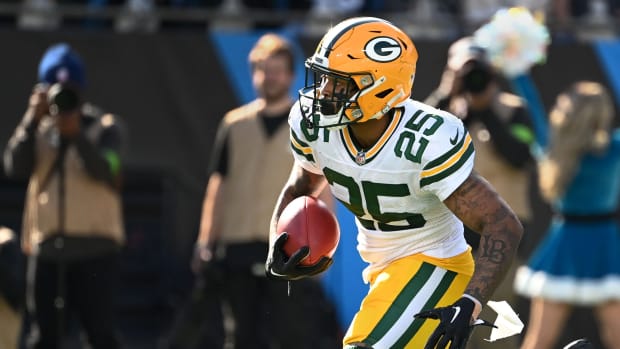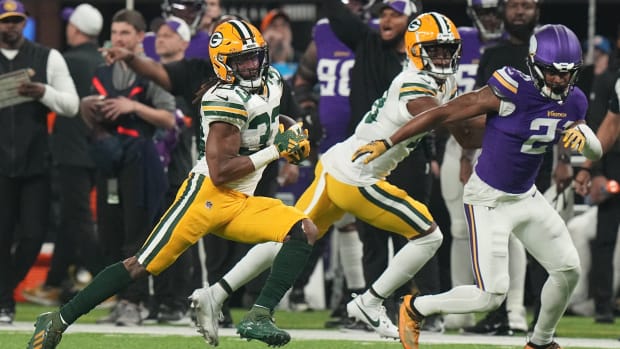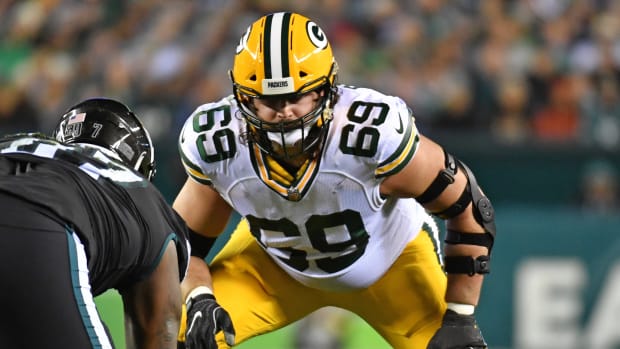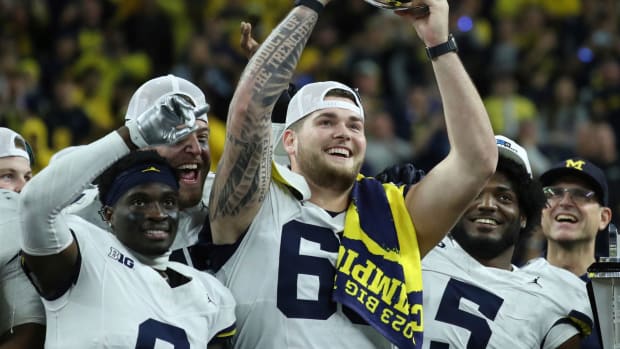The Case for Trading Rodgers for 2024 NFL Draft Picks
GREEN BAY, Wis. – When the Green Bay Packers finally do trade quarterback Aaron Rodgers to the New York Jets, what draft picks will they receive for the 2023 NFL Draft?
Perhaps none.
There’s a case to be made by both teams that 2024 draft compensation would be preferable.
From the Jets’ perspective, the reason is obvious. With a solid overall roster, they view Rodgers as a missing piece to win the Super Bowl. Obviously, their first-round pick, No. 13 overall, and their two second-round picks, No. 42 (acquired from the Browns last week for receiver Elijah Moore) and No. 43, could add additional instant-impact performers.
Rodgers, of course, might be only a one-year rental. Accumulating as much talent as possible in 2023 obviously is Jets general manager Joe Douglas’ goal.
For Packers general manager Brian Gutekunst, there are some logical reasons to take those picks in 2024.
First is the salary cap. According to OverTheCap.com, the Packers are $22.1 million under the salary cap. The additional dead-money hit from trading Rodgers would push that down to about $13.4 million. Signing the draft picks would take another bite out of the apple, leaving them with about $9.5 million.
If Gutekunst is holding out for the No. 13 selection, that would be an expensive pick. According to OTC, the first-year cap charge will be about $3.35 million. That would be a nice chunk of change to keep off the cap. The combined cap charges for the second-round picks will be about $3.18 million.
Second, the 2024 draft is supposed to be better than the 2023 draft, a pair of scouts predicted. The infusion of NIL money persuaded many players who might have entered the NFL to return to school.
From 2019 through 2021, the final three years pre-NIL, the three-year average for early entrants was 119. In 2021, the final pre-NIL year, there were 128 early entrants. That plunged to 100 in 2022 and 82 in 2023. Comparing 2021 to 2023, there were 40 fewer early entries. That means the 2024 draft pool will be deeper and more NFL-ready with a few dozen quality prospects having gained an additional year of polish, strength and maturity.
Third, if the Jets are doing the Packers a favor by taking Rodgers’ contract off their hands, then the Packers would be doing the Jets a favor by allowing them to keep their first-round pick in this year’s draft.
Trades involving current vs. future compensation always benefit the team taking the future pick. A perfect example came in 2018. The Packers and Saints flip-flopped their first-round slots, with New Orleans moving up to No. 14 and Green Bay getting No. 27 along with a first-round pick in 2019. By the trade-value chart, the Packers essentially got the equivalent of the 61st overall pick for free.
There would be a price to pay by the Jets for keeping this year’s pick, which should allow Green Bay to get more draft compensation than it otherwise might considering the staggering financial cost of Rodgers’ contract.
One league source, who consistently has said the Packers should get a first-round pick for Rodgers – or enough compensation that it adds up to a first-round pick – thought the price from this scenario would be a first-round pick in 2024 and a third-round pick in 2025 that could move up to a second if Rodgers were to come back for a second season.
Fourth, it’s the hot seat on which the general managers sit. If Douglas were to acquire Rodgers at the king’s ransom of money and draft picks but the Jets fall on their face, would he be fired? If that’s a legitimate concern, why would he care about having traded away 2024 draft picks if he’s not around to benefit from them?
Gutekunst probably is in a safer spot, so long as Jordan Love isn’t a disaster. He signed a contract extension in 2022. While terms were not disclosed, his original deal signed in 2018 was for five years so he’s likely under contract through at least 2025. With time on his side, he wouldn’t face enormous pressure to put together an immediate rebuild with 2023 draft picks.
To state the obvious, there’s upside for Gutekunst taking the immediate compensation. Presumably, Rodgers would improve the Jets’ on-the-field fate, so there figures to be a big difference between the Jets picking 13th in 2023 to wherever they will pick in 2024 – though it’s worth remembering the Denver Broncos went from 7-10 to 5-12 after acquiring Russell Wilson. The presumed change in the standings would have to be addressed if the focus turns to future picks.
Moreover, Gutekunst no doubt would like to put Love in as strong a situation as possible in what the organization hopes will be a launching-point season. As reference, with the Packers transitioning to Rodgers in 2008, then-GM Ted Thompson drafted receiver Jordy Nelson and tight end Jermichael Finley with the Day 2 picks.
However, to maximize the return, the Packers might find virtue by being patient and taking the payday in 2024.
Green Bay Packers Free Agency and Draft News
The case for Will McDonald IV as first-round pick
Breaking down NFL.com four-round mock
Breaking down PFF’s three-round mock
Taking a fresh look at Packers’ 14 free agents





